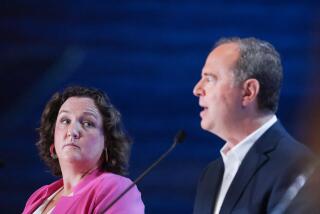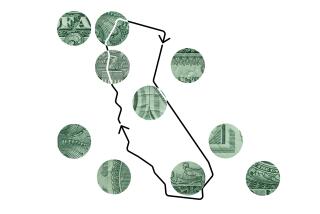Odds Against Independent Run, Experts Warn : Politics: Powell wouldn’t stand a chance against party money, campaign watchers say. Rules work against all but wealthiest outsiders.
- Share via
WASHINGTON — If Colin L. Powell is seriously thinking about running for President as an independent, experts in campaign finance are unanimous in their advice: Forget it.
The assets that the major parties can array against him are simply too formidable to overcome, even for a candidate with Powell’s allure, they say. They warn that:
* The retired general would have to raise well over $100 million to compete on level terrain with the Democratic and Republican nominees.
* He would need to spend millions of dollars on state-by-state petition drives to gain ballot access (all told, about 810,000 signatures are needed for his name to appear nationwide) and millions more in some states to fight arcane rules designed to keep him off the ballot.
* And he would have to do all that while not being able to accept more than $1,000 from any individual donor in order to comply with federal campaign financing laws.
Moreover, Powell would be running without the national, state and local party organizations that perform the mundane work of political campaigns, from leaflet mailings to get-out-the-vote drives. Nor would Powell be able to draw upon the type of personal fortune that enabled billionaire Texas businessman Ross Perot to spend an estimated $68.3 million of his own money on his 1992 independent candidacy.
“The odds on [the presidential] battlefield are stacked overwhelmingly against him. He’s not like [Senate Majority Leader] Bob Dole or [Sen.] Phil Gramm with an established funding base to tap into,” said Josh Goldstein of the Center for Responsive Politics, which tracks political fund raising.
Goldstein also cautioned that the mere act of competing in the money game could tarnish the very aura Powell presumably would want to cultivate as an independent candidate.
Powell himself, in an interview with The Times, referred to “enormous difficulties” that would surround an independent presidential bid. He added: “Unless you can self-finance your candidacy . . . it is a very long shot.”
As an independent candidate, Powell could legally benefit from large expenditures on his behalf by wealthy backers, but only if those efforts were truly independent of his campaign or any of its agents. Federal campaign finance laws prohibit any such spending made “in cooperation, consultation or in concert” with the candidate--a tough standard to meet.
The established parties, in contrast, will be permitted to spend $12 million in direct support of their nominees after the national conventions in August. Both parties will also spend $40 million to $50 million in so-called “party-building” efforts, including grants to state parties, phone banks, direct-mail appeals and advertising.
All of that is in addition to the estimated $60 million in public funds that the Democratic and Republican nominees will be given for their general election campaigns next fall.
These realities have caused some of those encouraging Powell to run to advise him to do it within the Republican Party.
“As a military leader, Powell knows better than to start a campaign with new recruits to fight a two-front war with forces on his left and right flanks armed with all the organization and strength of the established parties,” said Charles Kelly, leader of Citizens for Colin Powell, an unauthorized group promoting the retired general’s candidacy.
Kelly and others who want Powell to run recently met with a former Perot associate who warned them of the legal and financial hurdles in the way of an independent candidacy. Accordingly, these backers say they believe that Powell should declare himself a Republican and begin raising money from both grass-roots sources and big-money donors--and soon.
Powell has said he will announce his electoral intentions later this fall, after he finishes a monthlong nationwide tour to promote his autobiography, “My American Journey.” But a November entry into the GOP primaries would put him nearly a year behind the fiscal front-runners, Dole and Gramm, both of whom will have raised nearly $20 million by the end of October.
Nobody doubts that Powell could raise a lot of money in a hurry. But he would have to spend much of it just as quickly to establish a presence in key early primary states, as well as put into place an effective money-raising apparatus.
“It takes time to gear up a direct-mail appeal,” noted Herbert E. Alexander, professor of political science at USC and an authority on campaign finance. “And where is he going to get mailing lists?”
One of Powell’s most zealous partisans has thought long and hard about the financial obstacles that would face his candidacy--and he has a plan.
John Reagan (Tex) McCrary, a legendary New York publicist who 44 years ago helped persuade retired Gen. Dwight D. Eisenhower to run for President, has hatched a fund-raising scheme that he’s certain will yield millions of dollars.
McCrary has designed a Christmas card with a picture of a $1,000 bill (“the maximum individual donation--get it?”) and the message: “Give yourself a present for 1996. Elect Colin Powell President.”
He plans to send the card to all 1,500 people on his Christmas card list and encourage all of them to send copies to everyone on their lists.
“It’s not a chain letter; it’s a chain-reaction letter,” the exuberant McCrary, 84, explained. “It’s a gimmick that will catch on.”
More to Read
Get the L.A. Times Politics newsletter
Deeply reported insights into legislation, politics and policy from Sacramento, Washington and beyond. In your inbox twice per week.
You may occasionally receive promotional content from the Los Angeles Times.










